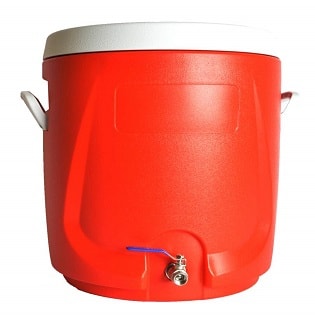Mash Tuns - Insulated and Lauter

-
-
- Stainless Steel Lauter Tun£240.00 £200.00
Mash Tun
A mash tun is a vessel used in the brewing process to convert starches in the grain into fermentable sugars. The process of mashing involves mixing milled grain with hot water to create a mash, which is then stirred and heated to specific temperatures for different lengths of time to activate enzymes in the grain. These enzymes break down the starches into fermentable sugars, which are then extracted from the mash.
The mash tun is an essential piece of equipment in the brewing process because it allows for precise control over the mashing process. The temperature and duration of the mash directly impact the flavour, mouthfeel, and alcohol content of the final beer. A well-designed mash tun ensures consistent results and allows brewers to create unique and complex flavours in their beers.
There are several types of mash tuns, including traditional insulated vessels, direct-fired vessels, and insulated lauter tuns. Each type has its advantages and disadvantages, depending on the size of the brewery and the type of beer being brewed ( we don't stock all these different types, information only )
In addition to its importance in the brewing process, the mash tun also plays a role in sustainability. Many breweries are investing in energy-efficient mash tuns that use less water and energy than traditional designs. By reducing water and energy usage, these mash tuns help breweries reduce their carbon footprint and save money on utility costs.
In summary, the mash tun is a crucial piece of equipment in the brewing process that allows brewers to convert starches in the grain into fermentable sugars. Its importance lies in its ability to provide precise control over the mashing process and its role in creating unique and complex flavours in beer. As breweries continue to invest in sustainable equipment, the mash tun will play an increasingly vital role in reducing the industry's environmental impact.



